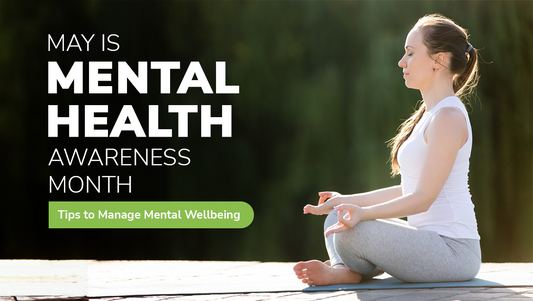Mental health influences your overall life, including how you think, behave, and feel. So, pause and reflect on this mental health awareness month. Invest some time in mental well-being as you think about your physical health. Ensure balancing different aspects of life to promote mind and body wellness.
Let's understand the importance of mental health awareness and how you can bring improvement in your life.
Importance of Mental Well-being
As per a report, 60-70 million people have some form of mental illness. Thus, it's high time to maintain your mental well-being.
A healthy mind doesn't mean no bad times or experiences. Disappointments, loss, and change are part of everyone's life. However, mentally strong individuals can bounce back from life's adversity, trauma, and stress.
From overcoming challenges and building relationships to staying stress-free, everything depends on your mental well-being. Thus, neglecting mental health can result in a long-term psychological condition.
According to WHO, 1 in every 8 people globally have a mental disorder. So, paying attention to your mental well-being and taking prudent steps beforehand is crucial.
Common Mental Health Issues and Disorders
Mental health disorders can be occasional or chronic, which can impact your day-to-day functions. Here are some commonly diagnosed conditions worldwide.
Anxiety Disorder
This mental health condition makes it difficult to get through your day. Usually, a person reacts with dread in certain situations due to anxiety disorder. Symptoms of anxiety disorder are panic, nervousness, fear, sweating, and heart pounding.
Kristin Lothman (a mind-body counselor at mental health treatment centers) encourages self-care practice and mindfulness to manage anxiety.
Depression
Undoubtedly, depression is one of the most prevalent mood disorders these days. Depression is more than just feeling sad. Mood changes, low energy, and loss of interest are the key signs of this psychological condition.
On-time offline or online help for depression is crucial to take the appropriate measures.
Bipolar Disorder
It's a chronic mood disorder that causes drastic shifts in behavior, mood, and energy levels. Most people with bipolar disorder experience alternating depressive and manic episodes.
Depressive symptoms include irritability, feeling unhappy, or a loss of pleasure in activities. During a manic episode, a person can experience euphoria, increased energy, racing thoughts, sleeplessness, and impulsive reckless behavior.
Post-traumatic Stress Disorder (PTSD)
This mental health condition develops after a traumatic and terrifying event. People with PTSD experience scary and lasting thoughts, memories, and dreams about that particular situation. They can also become emotionally numb.
Eating Disorders
This complex mental health issue can happen to a person of any age and gender. An unhealthy relationship with food, weight, and body shape is a sign of this psychological problem. Some common conditions include binge eating, anorexia nervosa, and bulimia nervosa.
All these conditions require professional mental health help to manage food habits.
Symptoms of Poor Mental Health
Check out some basic signs to take relevant action before a minor condition turns into a severe mental health disorder.
- Poor sleep
- Loss of appetite
- Weight loss or gain
- Mood swings
- Low energy
- Feeling anxious, stressed, or depressed
- Bizarre thoughts
- Feeling worthless
- Withdrawal from family and friends
- Confused thoughts
- Changes in your sex drive
- Drug or alcohol abuse
Tips to Maintain Mental Health

If life has been tough lately, follow these crucial tips to manage any mental health issues properly.
Maintain Healthy Lifestyle
Switching to healthy lifestyle habits will drastically improve your mental health. Physical activities for mental health awareness provide various benefits, such as stress release, better sleep, and mood management.
So, managing your body also means taking care of your brain. Thus, exercising is an effective treatment for depression and anxiety as it helps the brain cope better with stress. You can opt for exercises that work best for your body, health, and training level.
What you eat also plays an integral role in the functioning of your brain and body. Your diet plan can include fruits, vegetables, whole grains, fatty fish, leafy greens, and nuts. Eating too many processed and junk foods is a strict no-no. Adding plant-based Satvam Repose Soothing Stress Supplement to your regime can also help manage life's stress.
You can consult a dietician to create a balanced and nutrient-rich diet plan based on your health requirements.
Further, having meals with people is also an excellent source of mental health treatment. This strategy not only improves bonds but also boosts your mood.
Get Sound Sleep
Proper sleep is a stress-buster. Sleeping seven to eight hours will help boost your mood, energy levels, and brain functioning. Make sure to maintain your sleep routine by going to bed at the same time daily.
Meditation or playing calming music to relax the mind before bed can help you fall asleep. Further, avoid caffeine and sugar consumption at night to improve your sleep. You can also use Satvam Nutrition Sleep Restore Supplement to induce relaxation and treat insomnia.
Go Offline
Take a break from social media and disconnect from your phone. Frequently seeing and checking other people's lives may lead to an inferiority complex. You start comparing yourself with others, which promotes feelings of low self-worth, anxiety, and depression.
Thus, adopt the healthy habit of limiting your daily screen time. Replace your online browsing sessions with meaningful activities like crocheting, drawing, reading, baking, or anything else you like. Further, turn off notifications at night to curb the constant urge to check your social media account or emails.
Talk It Out
Many people bottle things up inside to ignore painful feelings. Indeed, sharing your problems with someone requires courage. However, talking things through will give you relief and help change your perspective about how you feel. Interacting with others stimulates your brain, allowing you to think positively.
So, look around for someone you can trust to open up. It can be a family member, friend, neighbor, or office colleague. If not one-on-one, you can join social communities to receive online mental health support.
Spend Time with Nature
Nature has healing power. To cope with stress, go for a 30-minute morning or evening walk in the nearby park or lake.
Forest bathing is a unique strategy in Japan for mental well-being. The idea is to go on a jungle hike to experience nature's different sounds, textures, and smells for the healing effects.
Seek Professional Help
Feeling stressed is a part of everyday life, but if you’re feeling overwhelmed by it, seek professional help. Consult with a mental health professional who can help you manage stress and cope with overwhelming situations for improving your overall wellbeing.
FAQs
- What is mental health awareness?
First recognized in 1949, Mental Health Awareness Month educates the public about mental issues and conditions. The movement helps create awareness about the impact of trauma on the emotional, physical, and mental well-being of people of all age groups and communities. Raising awareness also teaches people how to maintain their daily lifestyle to stay mentally fit.
- Why mental health awareness is important?
Awareness about mental health will motivate people to include self-care practices in their daily routine. Besides, they won't be shy about discussing mental disorders or seeking professional help. The goal is also to lessen the stigma associated with psychological disorders.
Final Thoughts
It's okay not to be okay. However, looking after your mental health should be a part of your daily routine. Mental health awareness focuses on the overall value of health care and quality of life. Taking care of yourself means showing up more powerfully in life.

















